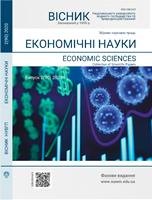FORMATION AND DEVELOPMENT OF EDUCATIONAL CLUSTERS AS AN IMPORTANT COMPETITIVE ADVANTAGE OF NATIONAL ECONOMY
DOI:
https://doi.org/10.31713/ve220206Keywords:
national economy, education, public policy, educational clusters, governing bodies, organizational and economic mechanism, efficiency assessment, competitive advantage.Abstract
The article deals with problems in the sphere of education in Ukraineon the basis of the works of scientists. It is determined that in order toensure the sustainable development of the economy and its competitiveness it is necessary to make changes in the requirements regarding the level and quality of education by means of formation of educational clusters in the country. The author has developed the basic conceptual provisions of the educational cluster, which will help increase the competitiveness of education in Ukraine. The conceptual provisions of the educational cluster include the following elements: creation of a single integration educational space; educational model, system multilevel integration; vertical and horizontal structure of interaction with the employer. The task of each of the structural elements is to create the advanced educational system of multilevel training of specialists in a cluster environment in accordance with the features of regional economic and social policy. The characteristics of the functions of the educational cluster governing bodies have been described. The stages of formation of organizational and economic mechanism of the educational cluster are distinguished. The assessment of the effectiveness of the educational cluster by the following aspects is carried out : competitive, business, regional, resource, cooperative. It is determined that increasing the competitiveness of educational services will be able to ensure the development of educational clusters in Ukraine as a result of certain conditions. The author systematized these conditions in thefollowing sequence : systematic development of the whole branch ofeducation and its individual elements : higher, vocational, generalsecondary, preschool; elimination of the internal competition in theeducational environment; implementation of the principles of partnershipand mutually beneficial cooperation; increasing the level of centralization of managerial decision-making in accordance with demand for certainspecialties.On the basis of the scientific research it is proved that formation anddevelopment of educational clusters is a significant competitive advantage of the national economy of Ukraine, which is able to influence the formation of state policy in the educational field.References
Mudra O. V. Realizatsiia sotsialnoho partnerstva u prostori osvitnoho klasteru. URL: http://ea.donntu.org: 202012.pdf (data zvernennia: 22.05.2020).
Reshetniak O. I., Zaika Yu. A. Orhanizatsiino-ekonomichnyi mekhanizm formuvannia osvitnikh klasteriv v Ukraini : monohrafiia. Kharkiv : Vyd-vo NUA, 2018. 204 s. URL: http://dspace.nua.kharkov.ua.pdf (data zvernennia: 22.05.2020).
Sokolova K. S. Ispolzovanie klasternogo podhoda v tselyah povyisheniya konkurentosposobnosti sistemyi obrazovaniya: sravnitelnyiy analiz mejdunarodnogo opyita. Sovremennyie issledovaniya sotsialnyih problem. 2010. № 4.1 (04). S. 531–541.
Zhuk O. P., Drozdovska L. O. Klasternyi pidkhid u protsesi optymizatsii systemy vyshchoi osvity Ukrainy. Visnyk ONU im. Mechnikova. Odesa, 2013. T. 18. Vyp. 1/3. S. 151–153.
Galimova L. I. Obrazovatelnyiy klaster kak mehanizm innovatsionnogo razvitiya proizvodstvennoy deyatelnosti. Vestnik Kazanskogo tehnicheskogo universiteta. Kazan, 2009. № 5. S. 125–127.
Reshetnyak E. I. Formirovanie obrazovatelnyih klasterov: otsenka sinergeticheskogo effekta. Vcheni zapysky Kharkivskoho humanitarnoho universytetu «Narodna ukrainska akademiia». Kharkiv, 2015. T. 21. S. 246–254.
Nataliia Savina, Olha Romanko, Konrad Gromaszek, and Saule Smailova «Information technology for evaluation of innovation indicators influence and investment activity on competitiveness of the region», Proc. SPIE 11176, Photonics Applications in Astronomy, Communications, Industry, and High-Energy Physics Experiments 2019, 1117625 (6 November 2019); https://doi.org/10.1117/12.2537073.
Nataliia Savina, Olha Romanko, Sergii Pavlov, Volodymyr Lytvynenko. Modern management of national competitiveness. Informatyka, Automatyka, Pomiary w Gospodarce i Ochronie Środowiska. № 2. Vol. 9. 2019/6/21. P. 68–71.

